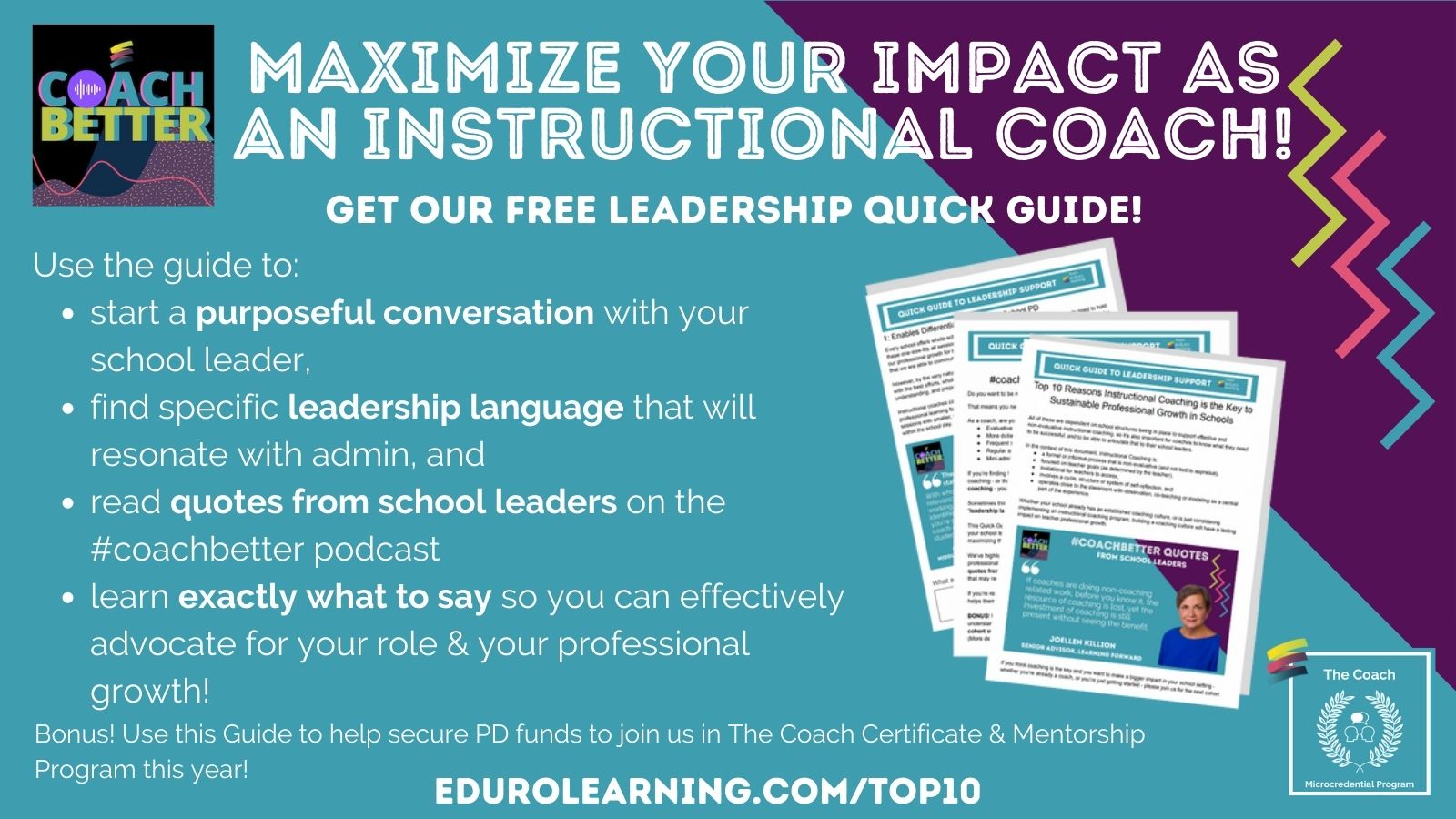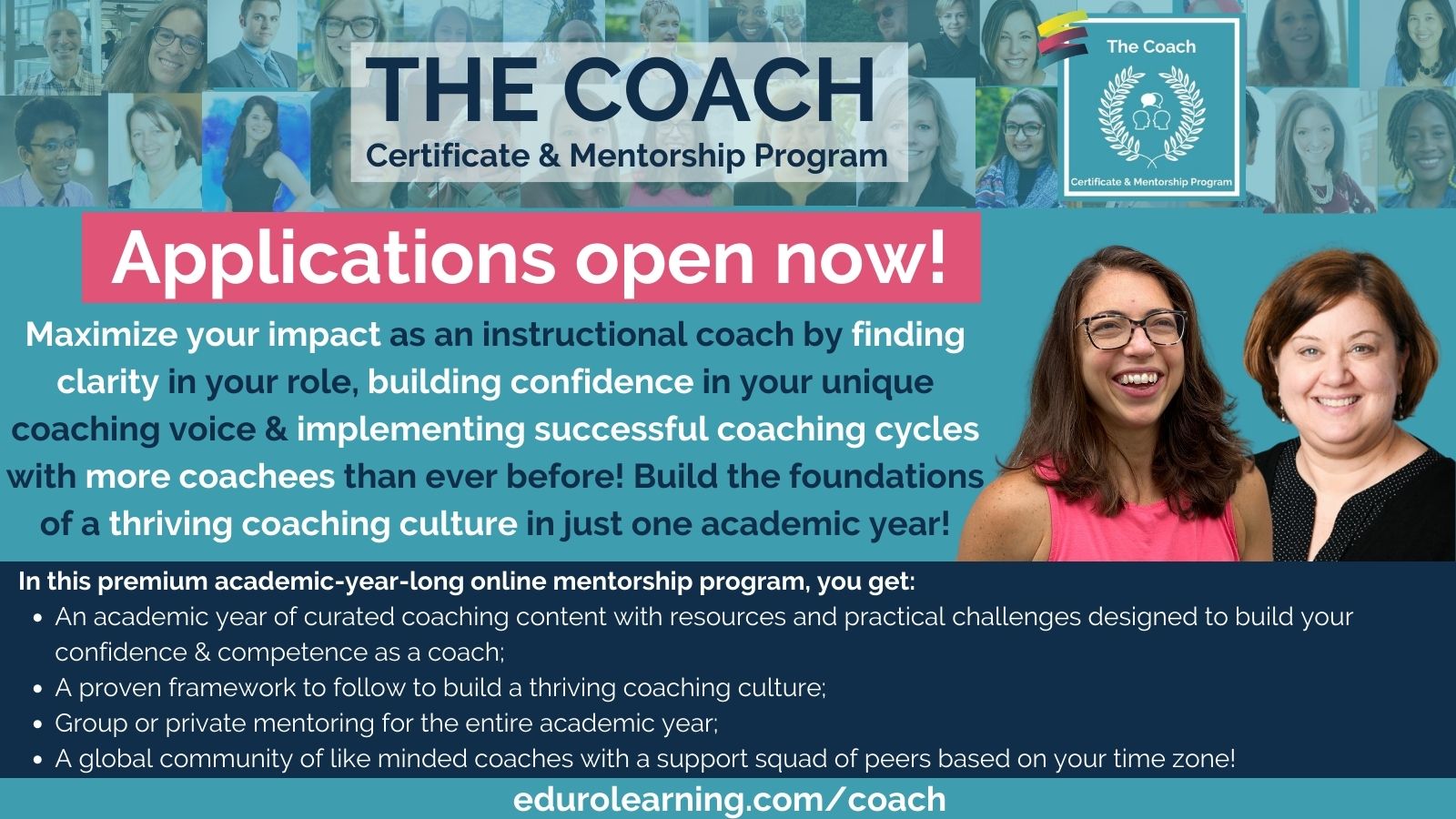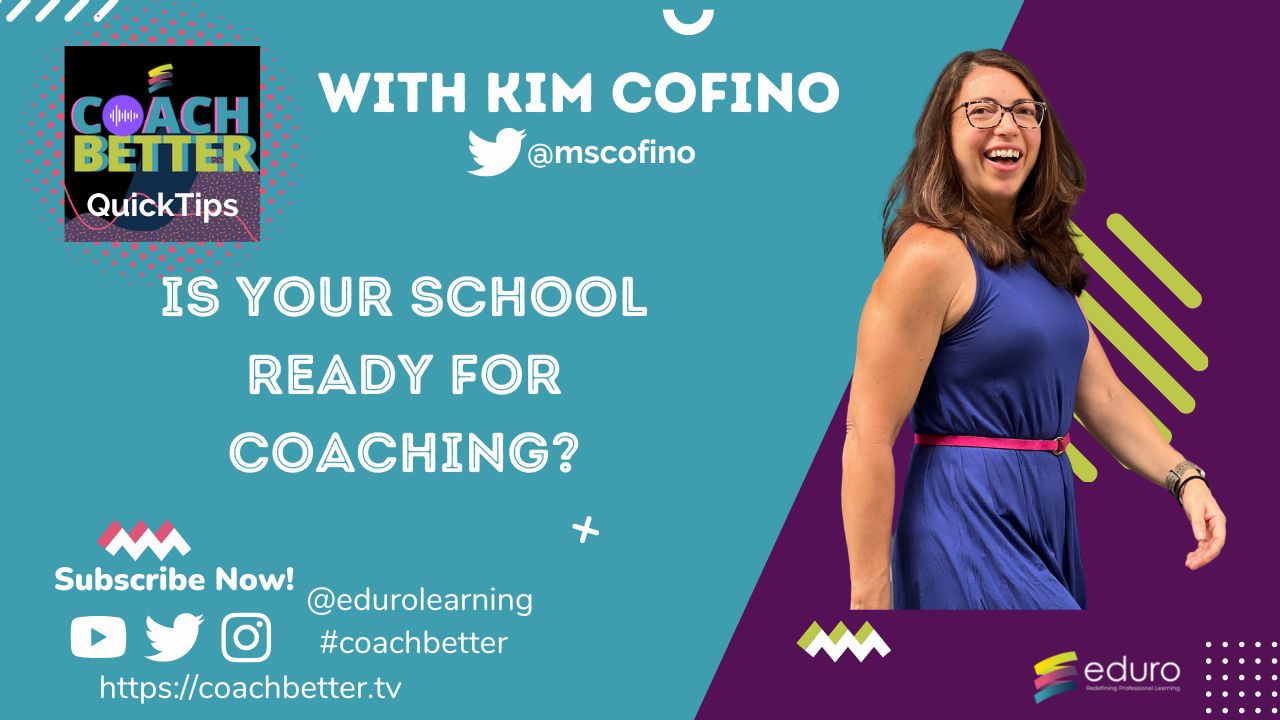How do you know if your school is ready for coaching?
If you listened to or watched our previous #coachbetter podcast episode with Jen Ricks you might have heard her talking about moving to a new school and recognizing that it was really important for her to really understand where the school was at before she started to build a coaching culture.
You can have this impression when you move from one school to the next that you’ll be able to hop from the same level of coaching readiness, to another school with the same level of coaching readiness, but that’s not always the case.
I’ve had the experience of going from one school that had a really strongly established coaching program with coaches in many different subject areas, to a school that had never had coaches before
When this happens, you can be like me – just kind of push forward – or you can be like Jen, and take the time to recognize where the school is at before moving forward. After having my own experiences just steamrolling through, I would definitely take Jen’s approach next time!
Today I’ve got a series of questions to help you think about and recognize where your school is at in terms of coaching readiness.
I’m excited to share these with you because they’ve really consolidated some of my thinking over the past couple of years, working with clients inside The Coach Certificate and Mentorship Program, because oftentimes I have clients come to me who are really passionate about coaching. They want it to be a coach, they’re excited about being a coach, but once they get into the role, they start to realize that,
“although this school may have hired me, they may not be prepared for actual coaching to happen…”
We need some of these foundational elements in place for coaching to be successful. That’s why inside The Coach, we start with the Clarity Phase. We start by understanding not only your role, but where is the school at, and are we ready for coaching at our school
You may come to The Coach from an already established coaching culture, and then you don’t need to go into depth on all of those pieces, which is another really nice thing about The Coach: you really can customize the learning journey for yourself because you work with a mentor and you have the option to personalize.
Even in a school where you have a strong coaching culture, sometimes it’s worth looking back and reflecting on…
What are those foundational elements that make coaching work here?
Because maybe someday you might consider moving to another school where you might have to work from this ground level again. And of course, it’s always great to be able to share the success in your school community and how it fits into the framework of building a coaching culture.
7 Questions to Help You Assess Your School’s Readiness for Coaching
Please note: some of them may seem a little obvious, so if you have these in place, fantastic, skip on to the next!
1: Do you have a shared vision about what coaching is and can be?
A shared vision means not just your coaching team, not just the professional learning team, but your school leaders, all the way up to your school Director or Head of School and your teachers all the way down to every single person that you’re going to work with in your coaching role.
- Can you find this vision somewhere?
- Is it easily accessible Is it on the website?
- Do others know it exists? Is it visible, and how, and when do you reference this vision?
- Did you talk about it when you wrote it four years ago and you’ve never referenced it again?
- Is it part of your consistent communication about why coaching is valuable in this institution?
2: Do you have a school leader who is an advocate for coaching?
This is really interesting because a lot of the time as coaches, we are the only individuals who are strongly advocating for coaching. We may be on a team, and there may be a couple of us, but when you get a champion on the Senior Leadership Team, then you really see coaching begin to flourish because coaching becomes part of all the professional learning that happens on campus. It becomes part of all the school goals that are decided by that Senior Leadership Team. So when you’re thinking about your school leadership…
- Who, on the SLT, is an advocate for you and coaching?
- How do you keep coaching on the radar in those higher level team meetings?
- If you don’t have an advocate there, how can you build some advocacy for coaching on the senior leadership team?
- What can you put in your your daily routines to help build an understanding of the power of coaching for those senior leader members?
3: What is your principal’s understanding of the coaching role?
This is such an important one, and it comes into Phase 1 of The Coach Certificate and Mentorship Program (actually so do the other two) In the phase one, we really talk about the alignment of your role with your school leader. If your principal sees you as someone who’s evaluating or just a cheerleader, or kind of like a mini admin, it’s going to be really hard for you to do proper coaching in your school setting.
Finding opportunities to build clarity and build understanding with your principal about the purpose and value of your role is key so that you can make sure you’re not being assigned tasks that are not really coaching. And so that your administrator isn’t asking you evaluative questions about teachers so that you are able to do the job you were hired to.
Do you need alignment and clarity on your role as a coach?
Do you want to be making the biggest impact you can, as an instructional coach?
That means you need to be spending your time actually coaching!

As a coach, are you finding yourself asked to do:
- Evaluative observation or feedback?
- More duties than any other teacher?
- Frequent sub cover?
- Regular exam monitoring?
- Mini-admin tasks, like organizing meetings or schedules?
If you’re finding that your schedule is frequently bombarded with things that aren’t actually coaching – or that you and your school leader are not aligned on the vision and practice of coaching – you may need to work towards clarity.
Sometimes this can be really challenging because, as coaches, we don’t always have the “leadership language” to talk about these kinds of big picture ideas.
This Quick Guide gives you the leadership language to have a purposeful conversation with your school leaders about investing in YOUR professional growth as a coach, and therefore maximizing the impact you can make in your school setting.
We’ve highlighted the top 10 reasons that instructional coaching is the key to sustainable professional growth in schools, from a school leaders perspective AND we’ve included key quotes from the #coachbetter podcast with school leaders, so you have the exact language that may resonate well with your school leaders.
If you’re ready to have this conversation with your school leaders, you may find this resource helps them understand why coaching is so valuable.
Get it for FREE here: https://edurolearning.com/quickstart
BONUS! Use the quotes & rationale inside this Quick Guide to help your school leader understand why they should invest PD funds to support you in joining our next global cohort of The Coach Certificate & Mentorship Program – which opens for registration soon!
4: What frameworks and structures do you have in place for coaching to be successful in your school?
This comes in Phase 2 of The Coach Certificate and Mentorship Program, where we talk about consistency. This is about building structures for coaching to be part of the regular practice of teaching and learning – scheduling time and processes so that coaching isn’t an add-on, it’s part of the way we run curriculum planning and professional learning on an everyday basis.
- Is there time built in the schedule for coaching?
- How does coaching become part of the regular conversations about curriculum planning and professional learning at your school?
- Are you part of those planning meetings or curriculum development?
- Is there any expectation to work with a coach as teachers or leaders in the school?
- Is your school built to sustain a coaching practice or are you constantly just kind of like fighting your way in there all the time, trying to make around peg fit in a square hole?
5: What is the culture around coaching
- What the teachers know or believe about coaching?
- Are teachers engaged or reluctant or resistant?
- Are you starting from an assets-based perspective or is coaching viewed as a deficit model in your school?
When we think about building a coaching culture, and we talk about this in Phase 3 of The Coach Certificate & Mentorship Program, we talk about building community. We talk about creating a model of coaching, creating a coaching environment, creating a coaching culture that really supports professional growth for everyone.
We’re all here to learn. We’re all here to grow. If we believe that student learning is at the core of what we do, we should also believe that adult learning is part of what we do here at schools. So how can we build that community around growth mindset, professional growth, that it’s okay to be coached? In fact, it’s valuable to be coached so that we have this perception and culture, that coaching is something we should all want.
6: What’s the history with coaching?
- What previous experience have educators in your school community had with coaching?
- If you’re finding reluctance or resistance, is there baggage around the concept of coaching?
- In this school previously, has coaching been viewed as a deficit model?
- Has it maybe only been for people on a support plan?
If so you have a lot of ground to cover to build up that coaching isn’t a deficit model, It isn’t about what you can’t do, it’s about the opportunity that we all have to grow.
If people have positive experiences in their past, can you build on those positive experiences? How can you engage in the existing culture around coaching to move it towards the positive that you’re looking for?
We work on that in Phase 3, Building Community in The Coach Certificate and Mentorship Program.
7: Who is building the culture?
We know we need to find an advocate on the senior leadership team. We know we need a positive environment around coaching in your school, but it’s also really important to know that you have some go-to people, some teachers, some leaders, some specialty experts in the school who are the people who are really invested in the success of coaching, aside from you, that community that you can build to build capacity on staff. So it’s not just on your shoulders.
That’s also in Phase 3, Building Community in The Coach Certificate and Mentorship Program, where we look at building capacity and building a community around coaching so it can grow beyond the work of “just” the coaches.
Where is Your School Readiness?
All of these questions are designed to help you think about where exactly your school is at in terms of building a coaching culture in terms of readiness for coaching.
As you go through those questions and think about…
- Where are we?
- Where do we have an opportunity to grow?
- Where are we already strong?
We work on all of those inside The Coach Certificate and Mentorship Program. In fact, one of the resources in our program is an article that I’ll share here that I think you’ll find really helpful. It’s from Jim Knight and it’s called Moving From Talk to Action in Professional Learning and the Stages of Implementation. He talks about coaching from the perspective of what I think of as the customer awareness model, but he uses the phrasing: “non-use awareness, mechanical use routine use and proficient use”.
We’re working towards that proficient level of coaching in our communities, but analyzing, recognizing and understanding where we’re actually at as a community will help us move through those scales so we can become proficient thriving coaching communities.
Watch the Video
Maximize Your Coaching In The Coach Certificate & Mentorship Program
All of the topics that I discussed are part of The Coach Certificate and Mentorship Program. We go through 3 Phases in the program.
We start with Phase 1: Clarity, where you’re looking at defining your role, aligning that with your school leadership and communicating that with your colleagues.
We continue with Phase 2: Implement Consistently: where we talk about implementing consistently how you practice coaching, developing your coaching skills, asking better coaching questions, being able to manage coaching moments and making the right moves when you’re in a coaching conversation, what that looks like from an individual and then a school-wide scale.
We finish with Phase 3: Building Community: building capacity in your school, so that you’re creating a thriving coaching culture that goes beyond just you. Including sharing, celebrating your success and measuring the impact you’re making as a coach.

If any of that sounds interesting to you and you are curious and ready to dive deeper into your coaching practice (maybe you’re just getting started as a coach, or maybe you’ve been a coach for years)and you’re really ready to elevate and refine your coaching practice), you can do that in The Coach!
You have the support of a mentor throughout the program, so you really get the opportunity to personalize and customize your learning all the way through. There’s no point where everyone has to do exactly the same thing. You get a lot of opportunity to personalize, customize, and reflect on the implementation of your coaching skills as you go through the program, our next cohort, for the coach.
The Coach Certificate & Mentorship Program opens for registration once a year. Find all the details at edurolearning.com/coach

Recent Comments